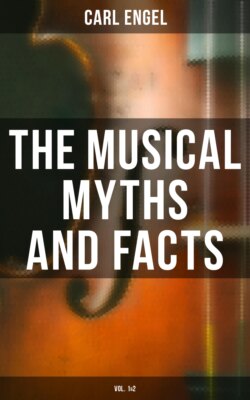Читать книгу The Musical Myths and Facts (Vol. 1&2) - Engel Carl - Страница 11
На сайте Литреса книга снята с продажи.
CURIOUS COINCIDENCES.
ОглавлениеTable of Contents
It is a suggestive fact that several nations in different parts of the world possess an ancient tradition, according to which some harp-like instrument was originally derived from the water.
The Scandinavian god Odin, the originator of magic songs, is mentioned as the ruler of the sea; and as such he had the name of Nikarr. In the depth of the sea he played the harp with his subordinate spirits, who occasionally came up to the surface of the water to teach some favoured human being their wonderful instrument.
Vainamoinen, the divine player on the Finnish kantele, according to the Kalewala, the old national æpos of the Finns, constructed the first instrument of this kind of fish-bones.
Hermes, it will be remembered, made his lyre, the chelys, of a tortoise-shell.
In Hindu mythology the god Nareda invented the vina, a five-stringed instrument, considered as the principal national instrument of the Hindus, which has also the name kach'-hapi, signifying a tortoise. Moreover nara denotes in Sanskrit "water," and Narada or Nareda "the Giver of Water."
Like Nareda, so Nereus and his fifty daughters, the Nereides, mentioned in Greek mythology, were renowned for their musical accomplishments.
Again, there is an old tradition, preserved in Swedish and Scottish national ballads, of a skilful harper who constructs his instrument out of the bones of a young girl drowned by a wicked woman. Her fingers he uses for the tuning screws, and her golden hair for the strings. The harper plays, and his music kills the murderess.[8] A similar story is told in the old Icelandic national songs, and the same tradition has been found still preserved in the Faroe Islands, as well as in Norway and Denmark.[9]
May not the agreeable impression produced by the rhythmical flow of the waves and the soothing murmur of running water have led various nations, independently of each other, to the widespread conception that they obtained their favourite instrument of music originally from the water? Or is this notion traceable to a common source, dating from a pre-historic age—perhaps from the early period when the Aryan race is surmised to have diffused its lore through various countries? Or did it originate in the old belief of the world with all its charms and delights having arisen from a chaos in which water constituted the predominant element?
Howbeit, Nareda, the Giver of Water, was evidently also the ruler of the clouds; and Odin had his throne in the skies. Indeed, many of the musical water-spirits appear to have been originally considered as rain-deities. Their music may, therefore, be regarded as derived from the clouds rather than from the sea. In short, the traditions respecting spirits and water are not in contradiction to, but rather confirmatory of the belief that music is of heavenly origin.
